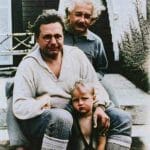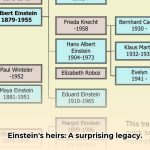While Albert Einstein’s genius redefined physics, his family life remains a source of intrigue, with living descendants carrying his legacy. His grandson, Bernhard Caesar Einstein, definitely kept the family tree growing with five kids of his own. While the exact number of great-grandchildren alive today is unconfirmed, it’s clear that Albert Einstein’s family line is still going strong. Let’s delve into the lives of his children and grandchildren, uncovering a mix of triumphs and tragedies.
Unraveling the Einstein Family Tree
Einstein’s personal life, much like his scientific theories, continues to pique the curiosity of many. To fully grasp the scope of his descendants, it’s essential to understand the key players:
Albert Einstein’s Children
-
Lieserl Einstein (born 1902): Einstein’s first child with Mileva Marić, born before their marriage. Her fate remains shrouded in mystery. Some historians suggest she might have died young, possibly from scarlet fever. Others propose she was potentially given up for adoption. The scarcity of information about Lieserl adds to the intrigue surrounding her life.
-
Hans Albert Einstein (1904-1973): The first son of Albert and Mileva, Hans Albert pursued a successful career as a professor of hydraulic engineering at the University of California, Berkeley, a path distinct from his father’s theoretical physics. Their relationship, however, was complex, experiencing strain after Einstein’s divorce from Mileva. Hans Albert had three sons – Bernhard Caesar, Klaus Martin (who tragically died in infancy), and David (adopted), – carrying the Einstein name forward.
-
Eduard “Tete” Einstein (1910-1965): Eduard, the youngest of Einstein’s sons, displayed early potential in music and literature. Tragically, at the age of 20, he was diagnosed with schizophrenia, leading to him spending a significant portion of his life in institutions. Einstein was deeply affected by his son’s illness, experiencing considerable guilt and sadness.
Bernhard Caesar Einstein: A Legacy Forged
Bernhard Caesar Einstein (1930-2008) holds a prominent place as Einstein’s only grandchild to live past childhood. While he didn’t follow directly in his grandfather’s footsteps, he carved his own path as a successful engineer, specializing in electron microscopes—a field deeply rooted in the very principles of physics his grandfather explored.
“I never felt the need to prove myself by becoming a second Einstein,” Bernhard once said. This quote highlights his desire to forge his own path independent of his grandfather’s shadow. Beyond his professional achievements, Bernhard lived a full life, becoming an avid collector of antique toys and a devoted father to his five children.
Do Any of Albert Einstein’s Grandchildren Still Live?
While Bernhard Caesar Einstein passed away in 2008, his five children ensure that Albert Einstein’s direct lineage continues. However, details about their lives remain largely out of the public eye. The possibility of their involvement in science, their personal lives, and the impact of their lineage remain open questions, adding layers to the ongoing fascination surrounding the Einstein family.
The Enduring Allure of the Einstein Legacy
The ongoing interest in Albert Einstein’s descendants speaks to the enduring power of his legacy. His brilliance continues to captivate, and the idea that his intelligence might be reflected in his descendants adds a layer of intrigue. The mystery surrounding Lieserl, the diverse paths of his grandchildren, and the possibility of great-grandchildren carrying his genes today make for a compelling narrative that transcends scientific achievement.
While definitive answers may remain elusive, the exploration of Albert Einstein’s family history provides a glimpse into the complexities of legacy, the interplay of nature and nurture, and the enduring fascination with one of history’s most brilliant minds.
- Unveiling the Enigma: Mansoureh Khojasteh Bagherzadeh’s Public Appearances & Private Life in Iran - July 18, 2025
- Unveiling the Mystery: Mansoureh Khojasteh Bagherzadeh’s Husband: A Rare Glimpse into a Private Life - July 18, 2025
- Unveiling Masoud Khamenei’s Mother: Power, Influence, and Iran’s Future - July 18, 2025
















